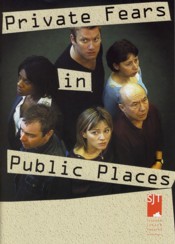Private Fears in Public Places
| Private Fears in Public Places | |||
|---|---|---|---|
 |
|||
| Written by | Alan Ayckbourn | ||
| Characters | Nicola Stewart Dan Ambrose Charlotte Imogen Arthur (voice only) |
||
| Date premiered | 17 August 2004 | ||
| Place premiered | Stephen Joseph Theatre, Scarborough | ||
| Original language | English | ||
| Subject | Various | ||
| Genre | Drama | ||
| Setting | Various homes, bars and workplaces | ||
| Official site | |||
| Ayckbourn chronology | |||
|
|||
Private Fears in Public Places is a 2004 play by British playwright Alan Ayckbourn. The bleakest play written by Ayckbourn for many years, it intimately follows a few days in the lives of six characters, in four tightly-interwoven stories through 54 scenes.
In 2006, it was made into a film Cœurs, directed by Alain Resnais.
The title was originally chosen for a play Ayckbourn was writing in 1994, but which was replaced by another new play, Communicating Doors.
Ten years later he used the title for this very different play — following the practice of rescuing redundant titles first employed by Ayckbourn for Absurd Person Singular back in 1972.
As with Absurd Person Singular, Private Fears in Public Places has little in common with the play for which its title was first devised. It was written for performance by the Stephen Joseph Theatre Company late in the 2004 season, using six of the seven actors already cast in Drowning on Dry Land, a new Ayckbourn play performed earlier in the year, thus to some extent repeating the repertory format used in 2001 for the Damsels in Distress trilogy when three different plays were written for the same cast.
Another influence was Ayckbourn's intention to write a "film on stage" using fast cross-cutting between scenes. In the programme notes for the play, he cited The Revengers' Comedies, Bedroom Farce, How the Other Half Loves and his children's plays as examples. The main effect is that the play reproduces the cinematic effect of cutting from one scene to another through use of lighting and mini-sets.
It was written at a time when the news included reports of abuse of military prisoners in Iraq. Whilst there is only a passing reference in the play, and no direct mention made of the 2003 Iraq war, it forms part of the character of Dan, an ex-officer relieved of his commission through his failure to prevent a military scandal caused by the men under his command.
...
Wikipedia
